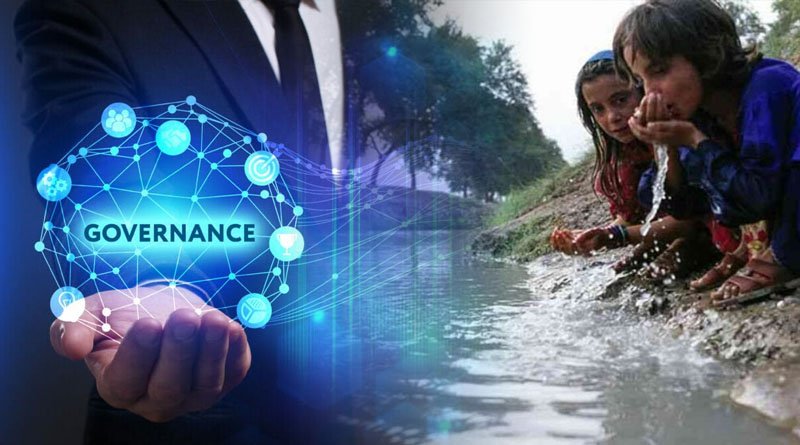The situation is concerning, as country’s water availability has decreased from 5,600 cubic metres per capita in 1951 to 908 cubic metres today, causing the country to be water stressed.

Following the disastrous year of 2022, the country experienced a one-of-a-kind pattern of natural disasters that severely impacted its economy, livelihoods, lifestyle, and social fabric while also posing water scarcity challenge and food security challenge.
People’s suffering in flood- and drought-affected areas should serve as a wake-up call to policymakers, who should devise prudent strategies to conserve its resources, particularly the rapidly dwindling water supply.
Experts believe that the time has come to devise a well-thought-out plan to implement a water pricing regime with an improved governance model to address the country’s growing water scarcity challenge.
The situation is concerning, as the country’s water availability has decreased from 5,600 cubic metres per capita in 1951 to 908 cubic metres today, causing the country to be water stressed. With our population already estimated to have crossed 220 million from 34 million in 1951, it is feared that the country would soon fall into the “water scarce” category.
“Every year, approximately 29 million acre-feet (MAF) of water is wasted in the country due to poor storage facilities and silt accumulation in the main Tarbela and Mangla water reservoirs,” said former WAPDA Chairman Shams ul Mulk. “Every year, this water waste costs our economy billions of rupees.”
“Unchecked population growth, in combination with a lack of water conservation and storage facilities, will result in much tougher days ahead,” he predicted.
Given that our current Rabi crop is facing a 38% water shortage, it is clear that we will be rapidly depleting our water reserves while spending our precious foreign exchange on food imports in the near future.
Another issue raised by Pakistan Water Gateway, a non-governmental water-research portal, is the depletion of river water resources and the massive pumping out of groundwater.
“If groundwater depletion continues at its current rate, we will face widespread water poverty in the coming years,” the portal stated, recommending that efficient water management be at the forefront of our policies when developing agricultural and industrial sector projects. “Water scarcity challenge affects almost every continent, with approximately 1.2 billion people, or nearly one-fifth of the world’s population, living in areas of physical scarcity,” said Arshad Abbasi, a water expert.
Furthermore, 500 million people are approaching this situation, with another 1.6 billion, or nearly one-quarter of the world’s population, facing economic water scarcity,” he added, warning that Pakistan was not an exception.
Despite the respective governments’ efforts to address the looming water scarcity challenges, the desired results have yet to be realised.
“We need to take timely steps to ensure water management in agriculture, domestic, and industrial sectors through an awareness campaign, the adoption of technology, and the imposition of restrictions,” said Dr. Muhammad Ashraf, Chairman of the Pakistan Council for Research in Water Resources (PCRWR).
“Using the latest technologies, we can save the majority of the water wasted during irrigation,” he said. “If our population continues to grow at the same rate and water resources remain constant, we will reach absolute water scarcity (less than 500 cubic metres per capita) by 2025.”
He stated that the PCRWR Water Report issued a detailed report in 2018, which resulted in the approval of the National Water Policy that same year, after a 30-year stalemate.
“PCRWR, for its part, has played the role of a whistleblower, warning that if population growth continues at its current rate, a single dam that would take at least ten years to complete would not be sufficient to meet our water needs,” Dr. Ashraf said.
“Widespread urban sprawl and the erasure of watershed areas resulted in decreasing rains and urban flooding.” In this case, he emphasised not only strict water conservation strategies but also water metering and charging consumers based on water usage.
“Water is gold to me.” Everything has an alternative except for water. As a result, we must conserve it today in order to have a better tomorrow. He stated that 60% of our population lacks access to safe drinking water, and the country anticipates a 30% water shortage by 2030. “PCRWR samples from rivers at certain levels had zero dissolved oxygen, indicating that no aquatic life can survive in this water, which is another alarming indicator,” said the researchers.
Dr. Ashraf suggested creating irrigation zones, improving on-farm water usage efficiency, governance and legislation, site-specific solutions, and mainstreaming youth.
“Engaging youth in water conservation initiatives is critical for an overall behavioural change,” he said, and he suggested more research on the waterfront and sharing knowledge with all stakeholders on efficient water management.
The latest IPCC Report’s message on climate change and the environment is also very clear, highlighting the increased frequency of natural disasters that are expected to cost vulnerable countries billions of dollars, as seen during our recent floods.
“National water security is based on urban, economic, and other security, and Pakistan has the lowest water security in all five sectors,” said Dr. Mohsin Hafeez, Country Representative of the International Water Management Institute (IWMI).
“We must consider why 90% of our water is used solely for agriculture and develop water-sharing agreements for rivers.”
Simi Kamal, an IWMI Board member, believes that engaging youth in water conservation practises will benefit their technological savvy, entrepreneurialism, and peering approach.
“Let us make them our lobbyists to spread the water conservation message across the country and to bridge the gap between government and citizens,” she said.
